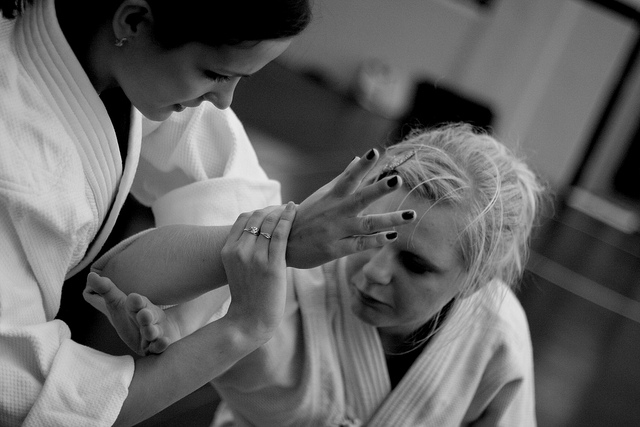I first learnt it at my university Aikido club.
It has helped make me make tough decisions under pressure and saved my life more than once.
I used it after learning a dictator wanted me dead in Ethiopia, in an Israeli stairwell under rocket fire, after getting sober and walking past a pub for the first time, and when my sister called to tell me she was in an ambulance with my father, who had tried to kill himself.
Centring is a broad term that covers various body-mind techniques for self-regulation or managing our state.
Centring techniques often involve reducing arousal levels and the famous “fight or flight” reaction. This is often just what we need in a stressful world. However, centring also includes techniques for creating more alertness and stimulation, or shifting our state in other ways.
More colloquially, it’s about getting our sh*t together…fast.
Sometimes, I’ll introduce centring by asking people to compare how different they are on their best and worst days. Centring is a way to have more good days.
At 17, just before I went away to university, I was at a low point. I had lost my first love, become an alcoholic, suffered from depression, and was borderline suicidal. After discovering Aikido, I realised that wisdom and healing resided in the body—not just the brain. I became more interested in that than my psychology degree. Yet ironically, centring helped me in a challenging exam that I hadn’t prepared for. I scraped a pass, which kept me in university.
I used centring in more tests and presentations, and even on dates with girls. After graduating, I applied it to work in outdoor education: at the top of climbing towers and mountains.
In my early 20s, whilst studying Aikido in California, I was called home under tragic circumstances.
Rachel, my closest friend from university, had a sudden psychotic episode and committed suicide by jumping from a suspension bridge. That night, a huge storm lashed Marin County, felling trees and battering the small wooden building I stayed in. I cried like the torrential rain outside, into the arms of my then lover. She managed to get me through the floods, to the airport the next day, and I went to Bristol, UK, where Rachel had lived.
I sat with her parents, sister and our friends from university. I centred many times there and during the funeral service. It enabled me to be a rock for those who needed me, while never losing touch with my grief. This episode really brought home how effective centring was—even in really tough times.
I was once involved in a car accident, after a misjudged attempt to overtake a truck. As the car rolled and crashed through a field, glass fragments falling around me, I thought, ‘Screw it, I might as well centre now.” I walked away with only a few scratches, much to my own surprise and that of the emergency services.
I’m an embodiment specialist now. This means I know all about working with the body for personal and professional development. I have a toolbox of great techniques, but centring was the first one I learned and is usually the first one I teach others.
I remember bumping into a woman from one of my first workshops seven years later. I was with another group I was training at the time. “Oooh,” she exclaimed, “Teach them that centring thing! What’s your name, again? I don’t remember much else from your training, but centring changed my life!”
Another early local government client commented that she had used centring to stay calm in a severe earthquake while on holiday in China, years after learning it.
I have heard from numerous humanitarian aid workers—those who have worked in areas of starvation, torture, mass-rape and war—that centring has helped them stay safe and sane. But it’s not about just the dramatic stuff.
I think of the Swiss working mother who felt overwhelmed by her workload and couldn’t turn off at the end of the day. She now centres at the start and end of every working day. There’s the British IT manager, who’s a great guy with a bad temper. He centres to control his outbursts and got his career and marriage back on track. There’s the young graduate in a Dutch telecoms company who centres to overcome her nerves when giving presentations to senior managers, the geeky guy who got nervous with girls but now asks people out on dates, and the gay teenager who was bullied and now stands up for himself.
We can centre during domestic arguments about chores, when managing too many e-mails, when waiting for a delayed train, and after reading an annoying Facebook comment. Centring can help us with the thousand little challenges and the occasional major tests that make a life. But as I always tell my clients: don’t just believe what I say, try it for yourself!
Here is a simple “ABC” centring technique I teach. I’ve found this one works well with most people. It can be done sitting or standing.
Awareness:
Become aware of the present moment, noticing what you can see, hear and feel. Use all of the five senses. Progress to noticing what you can feel in your body. Start from the feet and work your way up. Notice your breathing.
Balance:
This refers to both your posture and your attention. Be grounded (relax down), but also reach up. Stand in a balanced manner, so that you’re not tilting to one side, slouching forward or arching back. Have an expansive sense of your attention reaching out in all directions, like a sphere surrounding you. Imagining you’re glowing like a lightbulb may help.
Core relaxed:
Relax the centre line or core areas of your body: your eyes, tongue, jaw, chest and belly. Then breathe deeply into the abdomen.
Try centring in different situations. Compare the results before and afterward. Do also remember that, like most things, centring takes practice and you may have off days. You’ve just read how centring has changed my life, but even I sometimes find I’ve let myself get too far into an unhelpful state for it to be fully effective. Keep practising anyway!
~
Author: Mark Walsh
Image: rudresh_calls/ Flickr
Editor: Khara-Jade Warren







Read 6 comments and reply